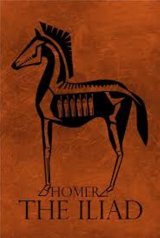Iliad Page #4
The Iliad is an ancient Greek epic poem in dactylic hexameter, traditionally attributed to Homer. Set during the Trojan War, the ten-year siege of the city of Troy (Ilium) by a coalition of Greek states, it tells of the battles and events during the weeks of a quarrel between King Agamemnon and the warrior Achilles.
Are cleansed; and cast the ablutions in the main. Along the shore whole hecatombs were laid, And bulls and goats to Phoebus' altars paid; The sable fumes in curling spires arise, And waft their grateful odours to the skies. The army thus in sacred rites engaged, Atrides still with deep resentment raged. To wait his will two sacred heralds stood, Talthybius and Eurybates the good. "Haste to the fierce Achilles' tent (he cries), Thence bear Briseis as our royal prize: Submit he must; or if they will not part, Ourself in arms shall tear her from his heart." The unwilling heralds act their lord's commands; Pensive they walk along the barren sands: Arrived, the hero in his tent they find, With gloomy aspect on his arm reclined. At awful distance long they silent stand, Loth to advance, and speak their hard command; Decent confusion! This the godlike man Perceived, and thus with accent mild began: "With leave and honour enter our abodes, Ye sacred ministers of men and gods!(60) I know your message; by constraint you came; Not you, but your imperious lord I blame. Patroclus, haste, the fair Briseis bring; Conduct my captive to the haughty king. But witness, heralds, and proclaim my vow, Witness to gods above, and men below! But first, and loudest, to your prince declare (That lawless tyrant whose commands you bear), Unmoved as death Achilles shall remain, Though prostrate Greece shall bleed at every vein: The raging chief in frantic passion lost, Blind to himself, and useless to his host, Unskill'd to judge the future by the past, In blood and slaughter shall repent at last." [Illustration: THE DEPARTURE OF BRISEIS FROM THE TENT OF ACHILLES.] THE DEPARTURE OF BRISEIS FROM THE TENT OF ACHILLES. Patroclus now the unwilling beauty brought; She, in soft sorrows, and in pensive thought, Pass'd silent, as the heralds held her hand, And of look'd back, slow-moving o'er the strand. Not so his loss the fierce Achilles bore; But sad, retiring to the sounding shore, O'er the wild margin of the deep he hung, That kindred deep from whence his mother sprung:(61) There bathed in tears of anger and disdain, Thus loud lamented to the stormy main: "O parent goddess! since in early bloom Thy son must fall, by too severe a doom; Sure to so short a race of glory born, Great Jove in justice should this span adorn: Honour and fame at least the thunderer owed; And ill he pays the promise of a god, If yon proud monarch thus thy son defies, Obscures my glories, and resumes my prize." Far from the deep recesses of the main, Where aged Ocean holds his watery reign, The goddess-mother heard. The waves divide; And like a mist she rose above the tide; Beheld him mourning on the naked shores, And thus the sorrows of his soul explores. "Why grieves my son? Thy anguish let me share; Reveal the cause, and trust a parent's care." He deeply sighing said: "To tell my woe Is but to mention what too well you know. From Thebe, sacred to Apollo's name(62) (Aetion's realm), our conquering army came, With treasure loaded and triumphant spoils, Whose just division crown'd the soldier's toils; But bright Chryseis, heavenly prize! was led, By vote selected, to the general's bed. The priest of Phoebus sought by gifts to gain His beauteous daughter from the victor's chain; The fleet he reach'd, and, lowly bending down, Held forth the sceptre and the laurel crown, Intreating all; but chief implored for grace The brother-kings of Atreus' royal race: The generous Greeks their joint consent declare, The priest to reverence, and release the fair; Not so Atrides: he, with wonted pride, The sire insulted, and his gifts denied: The insulted sire (his god's peculiar care) To Phoebus pray'd, and Phoebus heard the prayer: A dreadful plague ensues: the avenging darts Incessant fly, and pierce the Grecian hearts. A prophet then, inspired by heaven, arose, And points the crime, and thence derives the woes: Myself the first the assembled chiefs incline To avert the vengeance of the power divine; Then rising in his wrath, the monarch storm'd; Incensed he threaten'd, and his threats perform'd: The fair Chryseis to her sire was sent, With offer'd gifts to make the god relent; But now he seized Briseis' heavenly charms, And of my valour's prize defrauds my arms, Defrauds the votes of all the Grecian train;(63) And service, faith, and justice, plead in vain. But, goddess! thou thy suppliant son attend. To high Olympus' shining court ascend, Urge all the ties to former service owed, And sue for vengeance to the thundering god. Oft hast thou triumph'd in the glorious boast, That thou stood'st forth of all the ethereal host, When bold rebellion shook the realms above, The undaunted guard of cloud-compelling Jove: When the bright partner of his awful reign, The warlike maid, and monarch of the main, The traitor-gods, by mad ambition driven, Durst threat with chains the omnipotence of Heaven. Then, call'd by thee, the monster Titan came (Whom gods Briareus, men Ćgeon name), Through wondering skies enormous stalk'd along; Not he that shakes the solid earth so strong: With giant-pride at Jove's high throne he stands, And brandish'd round him all his hundred hands: The affrighted gods confess'd their awful lord, They dropp'd the fetters, trembled, and adored.(64) This, goddess, this to his remembrance call, Embrace his knees, at his tribunal fall; Conjure him far to drive the Grecian train, To hurl them headlong to their fleet and main, To heap the shores with copious death, and bring The Greeks to know the curse of such a king. Let Agamemnon lift his haughty head O'er all his wide dominion of the dead, And mourn in blood that e'er he durst disgrace The boldest warrior of the Grecian race." [Illustration: THETIS CALLING BRIAREUS TO THE ASSISTANCE OF JUPITER.] THETIS CALLING BRIAREUS TO THE ASSISTANCE OF JUPITER. "Unhappy son! (fair Thetis thus replies, While tears celestial trickle from her eyes) Why have I borne thee with a mother's throes, To Fates averse, and nursed for future woes?(65) So short a space the light of heaven to view! So short a space! and fill'd with sorrow too! O might a parent's careful wish prevail, Far, far from Ilion should thy vessels sail, And thou, from camps remote, the danger shun Which now, alas! too nearly threats my son. Yet (what I can) to move thy suit I'll go To great Olympus crown'd with fleecy snow. Meantime, secure within thy ships, from far Behold the field, not mingle in the war. The sire of gods and all the ethereal train, On the warm limits of the farthest main, Now mix with mortals, nor disdain to grace The feasts of Ćthiopia's blameless race,(66) Twelve days the powers indulge the genial rite,
Translation
Translate and read this book in other languages:
Select another language:
- - Select -
- 简体中文 (Chinese - Simplified)
- 繁體中文 (Chinese - Traditional)
- Español (Spanish)
- Esperanto (Esperanto)
- 日本語 (Japanese)
- Português (Portuguese)
- Deutsch (German)
- العربية (Arabic)
- Français (French)
- Русский (Russian)
- ಕನ್ನಡ (Kannada)
- 한국어 (Korean)
- עברית (Hebrew)
- Gaeilge (Irish)
- Українська (Ukrainian)
- اردو (Urdu)
- Magyar (Hungarian)
- मानक हिन्दी (Hindi)
- Indonesia (Indonesian)
- Italiano (Italian)
- தமிழ் (Tamil)
- Türkçe (Turkish)
- తెలుగు (Telugu)
- ภาษาไทย (Thai)
- Tiếng Việt (Vietnamese)
- Čeština (Czech)
- Polski (Polish)
- Bahasa Indonesia (Indonesian)
- Românește (Romanian)
- Nederlands (Dutch)
- Ελληνικά (Greek)
- Latinum (Latin)
- Svenska (Swedish)
- Dansk (Danish)
- Suomi (Finnish)
- فارسی (Persian)
- ייִדיש (Yiddish)
- հայերեն (Armenian)
- Norsk (Norwegian)
- English (English)
Citation
Use the citation below to add this book to your bibliography:
Style:MLAChicagoAPA
"Iliad Books." Literature.com. STANDS4 LLC, 2025. Web. 21 Jan. 2025. <https://www.literature.com/book/iliad_28>.




Discuss this Iliad book with the community:
Report Comment
We're doing our best to make sure our content is useful, accurate and safe.
If by any chance you spot an inappropriate comment while navigating through our website please use this form to let us know, and we'll take care of it shortly.
Attachment
You need to be logged in to favorite.
Log In